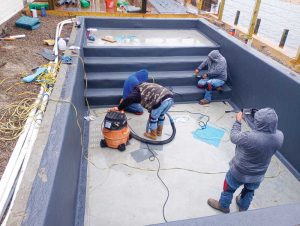
The built-in insulation incorporated within the ICF system serves to curtail heat loss and maintain pool temperatures, effectively insulating the pool’s interior from the colder soil surrounding the pool structure. Some manufacturers report the system can yield energy savings of up to 60 per cent with respect to water heating costs. This advantage is further bolstered by the system’s expedited construction timeline. Since the ICF system is made with 152-mm (6-in.) of concrete, it is significantly stronger than other pool building techniques.
Mark Teinert, owner of Pools by DC Design in Corpus Christi, Texas, says his company started working with concrete doing decorative pool decks and backyards 15 years ago but more recently started building pools.
“We have clay soil that shifts and moves and lots of water table issues, so I proactively chose the type of pool construction that could withstand these issues,” says Teinert. “We started with fibreglass pools but also built a few ICF pools in to offer custom features since fibreglass didn’t allow for customization.
“Then, when COVID hit, we couldn’t get fibreglass pools, so we quickly shifted to building more ICF pools.”
Before the pandemic, Pools by DC Designs installed mostly fibreglass pools and a few ICF pools; however, the company has now shifted to mainly building the latter.
Since Teinert valued the fact fibreglass pools are easy to maintain, he started looking for an interior waterproofing solution that offered the same ease of maintenance for his ICF pools. His company did try traditional vinyl liners but discovered the fabricated bag-style vinyl liner did not lend itself to the sharp corners of an ICF pool.
“I then discovered PVC membrane interiors, which has been used in Europe for decades,” says Teinert. “Once I did the research and completed the training with the manufacturer, I determined this was the perfect waterproofing interior product to pair with ICF pool construction.”






